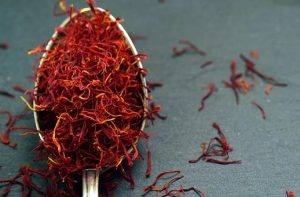Written by Harold Oster, MD. Results suggest that saffron and exercise have beneficial effects on depression and quality of life in women with multiple sclerosis.
 Multiple sclerosis (MS), an autoimmune disorder of the central nervous system, affects over 900,000 Americans. Most patients are diagnosed between twenty and forty years of age, with a female predominance of three to one. Multiple sclerosis causes focal neurologic deficits, physical disability, and cognitive decline1. Almost a quarter of patients with multiple sclerosis have clinical depression2. Aerobic exercise and strength training may have a beneficial effect on physical function and depressive symptoms in multiple sclerosis patients3. Saffron and its constituents affect levels of dopamine and other neurotransmitters, and in a few small studies, saffron has been associated with improved symptoms of depression4.
Multiple sclerosis (MS), an autoimmune disorder of the central nervous system, affects over 900,000 Americans. Most patients are diagnosed between twenty and forty years of age, with a female predominance of three to one. Multiple sclerosis causes focal neurologic deficits, physical disability, and cognitive decline1. Almost a quarter of patients with multiple sclerosis have clinical depression2. Aerobic exercise and strength training may have a beneficial effect on physical function and depressive symptoms in multiple sclerosis patients3. Saffron and its constituents affect levels of dopamine and other neurotransmitters, and in a few small studies, saffron has been associated with improved symptoms of depression4.
Farid Bahrami et al. studied the effects of physical exercise and saffron on depression and quality of life in women with multiple sclerosis. Eighty women were recruited from a single center in Iran and were randomized to four groups. The first received capsules containing 15mg of saffron to take twice daily for twelve weeks. They also participated in stretching and strength training guided by a physical trainer. Group 2 underwent the above exercise training without saffron. Group 3 received only saffron. Group 4 was a control group and received no interventions. At baseline, six weeks, and 12 weeks, participants were evaluated with the following three validated questionnaires. The Expanded Disability Status Scale consists of a rating system ranging between zero (no disability) and ten (death due to MS)5. The Beck Depression Inventory is a 21-point questionnaire with 0-13 signifying minimal depression, 14-19 mild depression, 20-28 moderate depression, and 29-63 severe depression6. The Multiple Sclerosis Impact Scale is a 29-point questionnaire evaluating the physical and psychological impact of MS on quality of life. Each question has a scale of zero to five, with zero signifying no impact and five meaning severe impact7.
The authors noted the following:
- At baseline, all participants had mild to moderate scores for depression, quality of life, and physical disability.
- At baseline, there were no significant differences among the four groups in the tested measures.
- At week six and week twelve, Beck Depression Inventory scores improved in the three intervention groups compared to the control.
- At week twelve, depression scores improved to a greater extent in the combined saffron and exercise group than in the group receiving saffron alone.
- At week twelve, the scores for the physical impact of MS on quality of life improved in the three intervention groups compared to the control. The saffron group scores did not improve as much as either exercise group.
- At week twelve, the scores for the psychological impact of MS on quality of life improved in the intervention groups compared to the control group. Scores in the combined saffron and exercise group improved more than the scores in the saffron group and in the exercise group.
- The Expanded Disability Status Scale did not improve significantly in the intervention groups compared to the control group.
Results suggest that saffron supplementation and physical exercise have beneficial effects on depression and quality of life in women with multiple sclerosis. A limitation of the study was the lack of blinding in the participants.
Source: Bahrami, Farid, Fatemeh Jafari Pour, Masoumeh Hassanpour, Mandana Saki, Farzad Ebrahimzadeh, and Leila Jafaripour. “The effect of saffron and corrective exercises on depression and quality of life in women with multiple sclerosis: A randomized controlled clinical trial.” Multiple Sclerosis and Related Disorders 79 (2023): 105038.
© 2023 Elsevier B.V. All rights reserved.
Click here to read the full text study.
Posted November 7, 2023.
Harold Oster, MD graduated from medical school in Miami, Florida in 1992 and moved to Minnesota in 2004. After more than 25 years of practicing Internal Medicine, he recently retired. Dr. Oster is especially interested in nutrition, weight management, and disease prevention. Visit his website at haroldoster.com.
References:
- McGinley MP, Goldschmidt CH, Rae-Grant AD. Diagnosis and Treatment of Multiple Sclerosis: A Review. Jama. Feb 23 2021;325(8):765-779. doi:10.1001/jama.2020.26858
- Marrie RA, Reingold S, Cohen J, et al. The incidence and prevalence of psychiatric disorders in multiple sclerosis: a systematic review. Mult Scler. Mar 2015;21(3):305-17. doi:10.1177/1352458514564487
- Motl RW, Sandroff BM, Kwakkel G, et al. Exercise in patients with multiple sclerosis. The Lancet Neurology. Oct 2017;16(10):848-856. doi:10.1016/s1474-4422(17)30281-8
- Marx W, Lane M, Rocks T, et al. Effect of saffron supplementation on symptoms of depression and anxiety: a systematic review and meta-analysis. Nutr Rev. May 28 2019;doi:10.1093/nutrit/nuz023
- Meyer-Moock S, Feng YS, Maeurer M, Dippel FW, Kohlmann T. Systematic literature review and validity evaluation of the Expanded Disability Status Scale (EDSS) and the Multiple Sclerosis Functional Composite (MSFC) in patients with multiple sclerosis. BMC Neurol. Mar 25 2014;14:58. doi:10.1186/1471-2377-14-58
- Jackson-Koku G. Beck Depression Inventory. Occup Med (Lond). Mar 2016;66(2):174-5. doi:10.1093/occmed/kqv087
- McGuigan C, Hutchinson M. The multiple sclerosis impact scale (MSIS-29) is a reliable and sensitive measure. J Neurol Neurosurg Psychiatry. Feb 2004;75(2):266-9.
